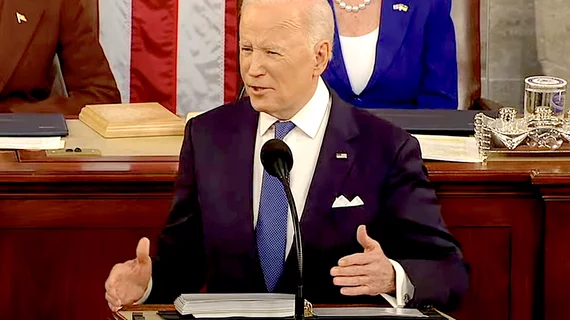President Biden outlines new COVID plan in state of the union address
U.S. President Joe Biden shared an outline of his new plan to combat the ongoing COVID-19 crisis during his State of the Union speech on March 1.
Noting that the U.S. has to stay on guard as the virus mutates, Biden focused on more testing, vaccinating more Americans. Biden specifically noted working to vaccinate younger children, as the current vaccines available in the U.S. are only approved for those ages 5 and older. In addition, Biden promoted the use of new treatments for those who are infected with COVID-19, including the Pfizer pill.
Biden’s first step in the plan was dubbed “Test to Treat,” so that people who test positive at a pharmacy can receive antiviral pills right there on the spot with no cost. Biden further announced that Americans can order more free COVID-19 tests starting next week from covidtests.gov. He also asked Congress to make funds available to rebuild stockpiles of masks, tests and antiviral pills.
The third arm of the plan includes ending the shutdown of schools and businesses. He noted that the federal government has reopened and those who have been working from home are returning to offices. In addition, kids have returned to schools, which should remain open, he said.
“With 75% of adult Americans fully vaccinated and hospitalizations down by 77%, most Americans can remove their masks and stay in the classroom and move forward safely,” Biden said. “We achieved this because we provided free vaccines, treatments, tests and masks.”
The fourth step of the plan aims to continue aiding vaccination efforts around the world. The U.S. has sent more than 475 million vaccines to 112 countries, more than any other country, he said.
In addition to his four-point plan, Biden made note of other healthcare initiatives during his speech, including increasing funding to combat the opioid epidemic, improving mental healthcare services for younger Americans and supporting veterans’ healthcare.
The initiatives were applauded by the American College of Physicians (ACP).
“The workload of internal medicine physicians has increased dramatically over the course of the pandemic, not just from the health impact of COVID-19 infections, but also from an increased number of patients with behavioral health disorders,” George M. Abraham, MD, MPH, MACP, FIDSA, president of ACP, said in a statement. “Efforts to support mental health professionals, to better integrate mental and behavioral health care into primary care settings, expanded access to telehealth services, and improved access for veterans seeking mental health services, are all key to tackling the mental health crisis in this country.”
Biden promises to reduce the cost of insulin and other drugs
As part of his dicussion on the economy and inflation control measures, Biden spoke about cutting the cost of prescription drugs. He specifically mentioned the rising costs of insulin, which he wants to cap costs at about $35 a month so patients can afford it, adding one in 10 Americans has diabetes. Biden said other drug prices also should be lowered to make them affordable to help contain rising healthcare costs.
"And while we’re at it, let Medicare negotiate lower prices for prescription drugs, like the VA already does," Biden outlined as a strategy.
Biden also mentioned Medicare is going to set higher standards for nursing homes to ensure patients get the level of care they expect.
Biden pledges stronger fight against cancer with new research
"Cancer is the number two cause of death in America, second only to heart disease," Biden said during the state of the union.
Last month, Biden announced a plan that he hopes to "supercharge" the Cancer Moonshot effort.
"Our goal is to cut the cancer death rate by at least 50% over the next 25 years, turn more cancers from death sentences into treatable diseases," Biden explained.
He called on Congress to fund the Advanced Research Projects Agency for Health (ARPA-H). This program is based on DARPA, the Defense Department project that led to the Internet, GPS, and many other advanced technologies used today. Biden hopes this program will have a similar impact on new breakthrough treatments for patients.
"ARPA-H will have a singular purpose, to drive breakthroughs in cancer, Alzheimer’s, diabetes, and more," Biden said.
Related State of the Union and Government Policy Content:
Trump asks for bill to lower drug prices in State of the Union address
Healthcare takeaways from Trump’s State of the Union speech
Find more healthcare policy content

